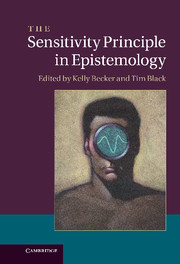Book contents
- The Sensitivity Principle in Epistemology
- The Sensitivity Principle in Epistemology
- Copyright page
- Contents
- Contributors
- Preface
- Chapter 1 The resilience of sensitivity
- Part I Defenses, applications, explications
- Chapter 2 Nozick’s defense of closure
- Chapter 3 Sensitivity meets explanation:
- Chapter 4 Sensitivity from others
- Chapter 5 Knowledge, cognitive dispositions and conditionals
- Chapter 6 Methods and how to individuate them
- Part II Criticism
- Part III In favor of safety over sensitivity
- Part IV Sensitivity without subjunctives
- Bibliography
- Index
Chapter 4 - Sensitivity from others
from Part I - Defenses, applications, explications
Published online by Cambridge University Press: 05 September 2012
- The Sensitivity Principle in Epistemology
- The Sensitivity Principle in Epistemology
- Copyright page
- Contents
- Contributors
- Preface
- Chapter 1 The resilience of sensitivity
- Part I Defenses, applications, explications
- Chapter 2 Nozick’s defense of closure
- Chapter 3 Sensitivity meets explanation:
- Chapter 4 Sensitivity from others
- Chapter 5 Knowledge, cognitive dispositions and conditionals
- Chapter 6 Methods and how to individuate them
- Part II Criticism
- Part III In favor of safety over sensitivity
- Part IV Sensitivity without subjunctives
- Bibliography
- Index
Summary
- Type
- Chapter
- Information
- The Sensitivity Principle in Epistemology , pp. 43 - 65Publisher: Cambridge University PressPrint publication year: 2012
- 3
- Cited by



